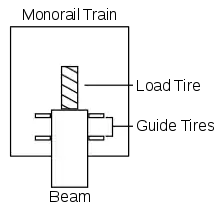Mark VI monorail
The Mark VI monorail (Mk6) is a monorail train used in the Walt Disney World Monorail System and the Las Vegas Monorail. The Mark VI started replacing the Mark IV monorails at Walt Disney World in 1989, replacing the final Mark IV by 1991.[1] The Mark VI later replaced the two ex-WDW Mark IV monorail sets of the Las Vegas Monorail (then named the MGM Grand-Bally's Monorail) in 2004. The Las Vegas M-VI versions of the trains differ from the Walt Disney World trains in physical appearance and the fact that they are automated, a trait the Walt Disney World monorails lacked until their automation starting in 2014.


Train specifications
- The trains were built by Bombardier of Canada for a reported cost of over $3.5 million per train.[1]
- Each cab car is 40 ft 5 in (12.3 m) long and each intermediate car is 28 ft 2 in (8.6 m) long. The 6-car trains in the Walt Disney World Monorail System total 203 ft 6 in (62 m) in length.[2]
- Each car can hold 20 seated passengers and 40 standing passengers. If available (as with the Walt Disney World Monorail System), the cab can hold 4 seated passengers and one pilot. (The cab is actually capable of holding 6 seated passengers; however, the capacity is limited to 4 in the Walt Disney World Monorail System). Passenger cab riding is no longer permitted after the July 5, 2009 incident.
Power
Each train has eight electric motors operating on 600 volts DC to produce 100 hp (75 kW) each.[3] The motors also serve as brakes via dynamic braking[3] and send power to resistor banks located between each car.[3] Walt Disney World's trains have been fitted with a governor which limits their maximum speed to 55 MPH (89 km/h); however, Disney regulations permit only 40 MPH (64 km/h).[3]
Suspension

The Mark VI Suspension consists of a load tire and guide tires. The load tire is a Michelin XTE2 445/65R22.5 [4] size tire, and rides along the top of the beam and provides traction for the movement of the monorail. The guide tires are just that; they guide the monorail on the beam. They are filled with nitrogen[4] to help reduce the chance of fire in the event of tire failure.
References
- "Disney/Bombardier". ALWEG. The Monorail Society. Retrieved 2007-05-09.
- "Disney/Bombardier Rolling Stock". ALWEG. The Monorail Society. Retrieved 2007-05-14.
- "Disney/Bombardier Propulsion, Braking & Power". ALWEG. The Monorail Society. Retrieved 2007-05-13.
- "Disney/Bombardier Suspension". ALWEG. Monorail Society. Retrieved 2007-05-14.